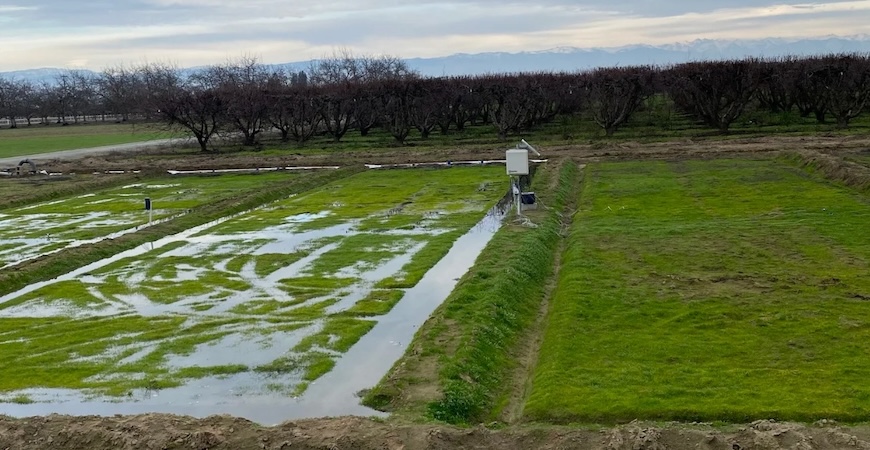
An almond orchard in Parlier provides a look into the future of farming.
Researchers at UC Merced and the University of California Agriculture and Natural Resources installed an irrigation system powered by artificial intelligence to deliver the precise amount of water needed and measure the results.
Led by computer science and engineering Professor Wan Du, the project was funded through the Fall 2023 Climate Action Seed Funds. It included a goal that’s almost as important as the work itself: spreading the word about the system and its potential.
The project includes two test beds: one irrigated via traditional methods and one served by the AI-powered system. Du is working alongside civil and environmental engineering Professor Safeeq Khan, a water resource management and soil science expert who built the soil model for the project, and computer science and engineering Professor Stefano Carpin, who developed the AI model.
“We will compare how much water each test bed will use,” Du said, “and then compare the production and result of these two fields.”
The system measures how much moisture is in the soil, then the potential for movement of water through a tree and eventually out the leaves. The data is uploaded to the internet.
“We have sprinklers under almost every tree so we can control them,” Du said. An algorithm processes the data and determines whether to open a sprinkler and how long it should run.
“We want to save as much water as we can,” Du said. “Saving water will reduce the cost to growers, and we can save the natural resource for the next generation.”
The system will be operational next spring, when the trees start to flower.
A group of students working with the nonprofit From Farms to Incubators.is sharing the news about the AI system. Amy Wu, founder and chief content director, developed a program to teach students how to effectively communicate agriculture technology.
Starting last September, the students learned digital storytelling, communicating science and documenting the work of AI.
“We also have a guest speaker series where they have been able to connect with rock stars in ag tech,” Wu said.
Wu came to UC Merced and met with the professors, then went to the farm at the Kearney Ag Research and Extension Center in Parlier to see the system and document the work.
“We created a menteeship program where students are learning about journalism and communications and also ag tech,” Wu said. “We trained them on interviewing and writing, to document the journey of the AI-generated crop irrigation system.”
They created a package of stories, photos and videos aimed at a broad audience from consumers interested in innovation to farmers seeking help tackling climate change.
Two of the students were undergraduates from UC Merced and a third was a recent graduate from California State University, Monterey Bay. All brought their own experiences and technical knowledge to the project. They developed new skills in writing and editing and connected with speakers representing women in agricultural technology.
Anvi Kudaraya, a UC Merced computer science and engineering undergraduate student from Pleasanton, said she learned the system architecture to get a deeper understanding of the sensors in the field, the AI irrigation model and data visualization. She wrote Python scripts to process real sensor data, which she said taught her “how to handle messy, real-world datasets and prepare them for machine learning models.”
Beyond the technical side, Kudayara said, she learned the value of collaboration and communication in research.
“I learned how important it is to connect technology to a broader purpose, especially when the work can impact something as essential as water use in agriculture.”
She said the project pushed her to step into areas outside her comfort zone, writing and revising the project article for publication and visiting the farm to document the work through photos.
“I came away with a stronger appreciation for how AI in agriculture is not only a technical challenge, but also a human one, requiring communication, community engagement and clear storytelling to make the technology meaningful and scalable.”
For a pilot program, Wu said, “I thought it went very, very well. We went into this not knowing what to expect, but we wanted to expose young people to the possibilities of communicating food and farming.”
Savio Jabbo, a computer science and engineering major from San Diego, said being able to see the cutting-edge research and experience the real world applications is amazing to say the least.
“Usually the work that goes into these projects goes unnoticed,” Jabbo said. “But when you see the impact that it has even on such a small scale, it feels like the whole world should know about it.”



